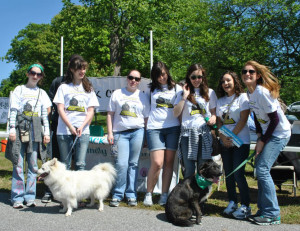Most Towson University students, faculty and staff have seen the occasional stray feline darting across a parking lot or hiding in the Glen. But few know there is an organized student group—and faculty adviser—that cares for the cats and ensures they are healthy and fed. We recently sat down with Margaret “Meg” Algren, an associate professor of mass communication and communication studies, and Brittany Nigro, a student, to talk about why they do what they do for Towson’s tiniest Tigers.
What is Tiny Tigers? Why was the club created, and what does it do?
Brittany Nigro: Tiny Tigers is an organization with about 30 members that takes care of the cat colony on campus. We feed the cats and monitor them to make sure they’re healthy. We also do TNR, which is Trap-Neuter-Release, where we trap cats in cages, get them neutered and then return them back into the community. Usually we take them to the spay-and-neuter clinics that the Maryland SPCA has once a month. And we volunteer when we can for other animal organizations—Defenders of Animal Rights is a big one.
Meg Algren: Towson said that we could do the TNR program if we got students to help, so that’s how Tiny Tigers started. And now Towson can be proud of the fact that it is a national model for humane colony management. I don’t know of any other feral cat group that is supported by the university like Tiny Tigers.
How did you find out about the cats? How long have they been there?
Algren: I’ve been here 12 years and the cats were here long before I was. And we’re surrounded by a lot of wooded areas and residential areas, so people drop cats off and they become wild. We have an educational program that explains to students why getting a kitten without parents’ permission is a really bad idea. Those kitties need to go someplace after school ends, and dropping them off in the Glen is not a viable option.
Why should we help these cats? Wouldn’t they be better off at a shelter?
Algren: Unless you grab the kittens when they’re young, you end up dealing with cats that are no different from foxes. They’ve been born and raised in the wild, and they do well in the wild provided that they get health support. Our vet is always so impressed with how healthy our cats are; we have never had a sick cat. I chalk that up to Tiny Tigers. So it’s a healthy colony, and it’s not hurting anybody. But if they went to shelters they would all be killed because they’re not adoptable.
What is Alley Cat Allies and what do they do?
Algren: Alley Cat Allies is a national advocacy group based in Gaithersburg. They help people understand the feral cat issue and they provide information. When we first started they were a major support because we had no experience, so they helped explain cat management to us and to the university. They also help with our TNR program.
How does the TNR program benefit the cats?
Algren: TNR benefits everyone because the cats also get shots and checkups. So they stay healthy and they don’t reproduce. It’s been proven that if you remove a cat colony, there is a vacuum effect and more cats come in to take their place. It’s like removing the squirrels from campus and thinking that there won’t be more squirrels within five minutes. There will be cats here whether they’re healthy or unhealthy, so we might as well make sure they stay healthy.
Nigro: When you keep the population down, you make sure that the cats all have enough space and resources to survive. And we can monitor them. So we keep the numbers down to keep the cats safe.

